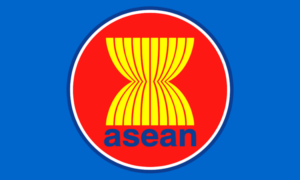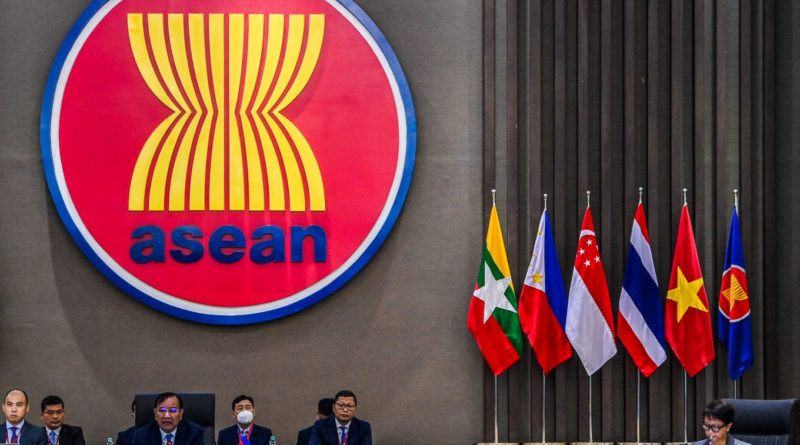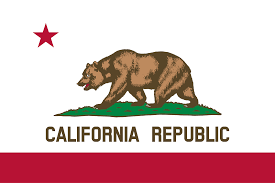HEADLINE-CLIMATE CHANGE | Asean to create center for climate change response

ASEAN JOINT STATEMENT
ON CLIMATE CHANGE TO THE 26th SESSION OF THE CONFERENCE OF
THE PARTIES TO THE UNITED NATIONS FRAMEWORK
CONVENTION ON CLIMATE CHANGE (UNFCCC COP26)
1. WE, Brunei Darussalam, the Kingdom of Cambodia, the Republic of Indonesia,
the Lao People’s Democratic Republic, Malaysia, the Republic of the Union of
Myanmar, the Republic of the Philippines, the Republic of Singapore, the Kingdom
of Thailand and the Socialist Republic of Viet Nam, Member States of ASEAN, on
the occasion of the 38th ASEAN Summit;
2. RECALLING previous ASEAN Joint Statements on Climate Change and ASEAN
Leaders’ Statements on Climate Change to the United Nations Framework
Convention on Climate Change (UNFCCC) and United Nations Climate Action
Summit;
3. NOTING that ASEAN Member States (AMS) have reaffirmed our commitments to
the UNFCCC and the Paris Agreement, by upholding the principle of equity and
common but differentiated responsibilities and respective capabilities (CBDRRC), in the light of different national circumstances, by:
a. Communicating respective nationally determined contributions (NDCs), that
reflect the highest possible ambition, with a view to facilitating the clarity,
transparency and understanding of these contributions in line with respective
UNFCCC decisions;
b. Strengthening ASEAN’s capabilities to prevent, mitigate, and manage
climate-related disasters through existing mechanisms under the ASEAN
Agreement on Disaster Management and Emergency Response (AADMER),
the ‘One ASEAN One Response’ Declaration and the ASEAN Declaration on
Strengthening Adaptation to Drought, and continuously mainstreaming
Climate Change Adaptation (CCA) and Disaster Risk Reduction (DRR) in the
implementation of AADMER Work Programme 2021-2025, including into the
Phase 2 Plan of Action of the ASEAN Disaster Risk Financing and Insurance
(ADRFI), and advancing the Southeast Asia Disaster Risk Insurance Facility
(SEADRIF);
c. Promoting sustainable management of forests, including through the
implementation of UNFCCC decisions on Reducing Emissions from
Deforestation and Forest Degradation and the role of conservation,
sustainable management of forests and enhancement of forest carbon stocks
in developing countries (REDD-Plus) under the guidance of the Warsaw
FINAL
2
Framework, as well as enhancing biodiversity conservation, protection, and
restoration of various terrestrial, coastal and marine ecosystems, and
welcoming the launching of ASEAN Green Initiative by the ASEAN Centre for
Biodiversity;
d. Continuing to achieve substantial progress of the energy efficiency
programme in which ASEAN surpassed its aspirational target by achieving
21 percent of energy intensity reduction and 13.9 percent renewable energy
share in the ASEAN total primary energy supply in 2018, and welcoming the
new ASEAN Plan of Action for Energy Cooperation (APAEC) 2016-2025:
Phase II (2021-2025) outlining updated regional targets, towards low GHG
emissions through energy transition in ASEAN;
e. Welcoming cross-ASEAN pillar cooperation, amongst others, the
development of the ASEAN Taxonomy for Sustainable Finance (ASEAN
Taxonomy) and other relevant work areas in the Joint Statement of the 7th
ASEAN Finance Ministers and Central Bank Governors’ Meeting (AFMGM);
f. Acknowledging Brunei Darussalam’s ASEAN 2021 Chairmanship Initiatives
of establishing the ASEAN Centre for Climate Change in Brunei Darussalam
and involving youth in climate change dialogues which takes form in the
ASEAN Youth on the Climate Action (ASEANyouCAN);
DO HEREBY:
4. EXPRESS our concern about the continuing rise in global greenhouse gas (GHG)
emissions in view of the findings and caution by the Intergovernmental Panel on
Climate Change (IPCC), through IPCC Assessment Reports (ARs), the IPCC
Working Group 1 contribution to the IPCC 6th AR entitled Climate Change 2021:
The Physical Science Basis, the IPCC Special Report on Global Warming of
1.5°C, the IPCC Special Report on Ocean and Cryosphere in a Changing Climate
and the IPCC Special Report on Climate Change and Land; and by the World
Meteorological Organisation (WMO) through the State of the Global Climate 2020
and the Global Annual to Decadal Climate Update for 2021-2025.
5. ALSO EXPRESS our serious concerns about the spread and severity of
Coronavirus Disease 2019 (COVID-19) that has imposed devastating impacts
since it was declared as a pandemic on 11 March 2020 by the World Health
Organization (WHO). We recognise the loss and suffering caused by the
pandemic, and extremely concerned with the socio-economic impacts, in
particular on vulnerable groups.
6. RECALL that Parties aim to reach global peaking of GHG emissions as soon as
possible, recognising that peaking will take longer for developing country Parties.
in accordance with Article 4.1 of Paris Agreement.
7. RECOGNIZE the potential contribution by developing countries in the form of
emissions avoidance, reductions, and carbon stock enhancement, dependent on
FINAL
3
the support provided by developed countries as guaranteed by the Convention
and the Paris Agreement.
8. ALSO EXPRESS that the Means of Implementation committed by developed
country Parties to the UNFCCC and the Paris Agreement, such as finance,
technology development and transfer, and capacity building are key drivers to
facilitate AMS and other developing countries to move towards a low GHG
emission and climate-resilient pathway.
9. FURTHER EXPRESS our grave concern about the continuing increase in the
losses and damages experienced disproportionately by developing countries
including AMS due to intensifying climate-related extreme weather and slow onset
events.
10.RECOGNIZE that climate change has potential negative impact to basic needs
for human life such as food, water, energy, clean and green environment, and
health including the supporting ecosystem, and that vulnerable groups, including
women, children, older people, people with disabilities and low-income people are
disproportionately affected by the adverse impacts of climate change.
11.We CALL UPON Parties to the UNFCCC and its Paris Agreement to:
a. Enhance and update the ambition of their respective NDCs under the Paris
Agreement, in accordance with the principle of equity and CBDR-RC, and
implement climate mitigation and adaptation commitments at regional,
national and sub-national levels, in advancing low GHG emissions and
climate-resilient development;
b. Enhance their adaptation efforts by implementing, among others, naturebased solutions and ecosystem-based approaches, focusing on the
protection of the livelihoods and health of the vulnerable groups;
c. Formulate and communicate their long-term low GHG emissions
development strategies taking into account the equity and CBDR-RC
principles in light of national circumstances, in accordance to Article 4.19, as
called for under the Paris Agreement;
d. Promote an intergenerational approach to climate action that is collaborative
across stakeholders, and gender-responsive, taking into consideration
vulnerable groups; and
e. Promote and enhance scientific research on how climate change is affecting
the entire Earth system, including the atmosphere, cryosphere, lithosphere,
hydrosphere and their interactions, the sustainable use and protection of
natural resources including ocean and marine ecosystems to ensure food
and water security.
12.WELCOME the Chile-Madrid Time for Action and other decisions adopted by the
25th session of the Conference of the Parties to the UNFCCC (COP25), the 15th
FINAL
4
session of the Conference of the Parties serving as the meeting of the Parties to
the Kyoto Protocol (CMP15) and the 2nd session of the Conference of the Parties
serving as the meeting of the Parties to the Paris Agreement (CMA2), in particular
the decisions related to the Katowice Climate Package. We CALL UPON Parties
to the UNFCCC and its Paris Agreement to:
a. Expedite the completion of pending negotiation issues in particular on matters
relating to Article 6 of the Paris Agreement; the terms of reference of the
Consultative Group of Experts (CGE); methodological issues under Article 13
of the Paris Agreement in particular the development of common reporting
tables and the common tabular formats under the Enhanced Transparency
Framework; and common time frames for NDCs;
b. Engage constructively on discussions that allow Parties to address the
urgency of climate change matters, in particular related to the Means of
Implementation to be provided by developed countries to support the
implementation of climate change adaptation and mitigation actions by
developing countries;
c. Take steps to implement the enhanced five-year Lima Work Programme on
Gender and its Gender Action Plan, including through mainstreaming the work
plan in their national development plans, as appropriate; and
d. Engage constructively on the further discussion on the Ocean and Climate
Change Dialogue to consider how to strengthen adaptation and mitigation
action.
13.ACKNOWLEDGE the NDC synthesis report prepared by the UNFCCC
Secretariat for COP26. WELCOME Parties that have submitted new and updated
NDC in accordance with the guidance on information to facilitate clarity,
transparency and understanding of NDC stipulated under Decision 4/CMA.1 and
ENCOURAGE Parties that have not done so to communicate or update their
NDCs as soon as possible.
14.UNDERSCORE the importance of the assessment and review of Pre-2020
ambition and implementation in order to build trust and confidence in the
multilateral process that will provide a firm foundation for enhancing a full,
effective, and ambitious implementation of the Paris Agreement in the post-2020
period. We CALL UPON developed country Parties to:
a. Undertake a clear and comprehensive evaluation and stocktake of the pre2020 commitments on mitigation and adaptation and finance to understand
progress made and to build mutual trust for Post-2020 climate action;
b. Fulfil their commitment of mobilizing USD 100 billion per year by 2020 through
2025 to support the implementation of mitigation and adaptation actions of
developing countries, including AMS;
FINAL
5
c. Continue and further scale up the mobilization of climate finance ahead of
initiating deliberations on the setting up of a new collective quantified goal from
a floor of USD 100 billion per year, which takes into account the needs and
priorities of developing countries including AMS; and
d. Take the lead by enhancing mitigation ambition including setting net-zero
emission targets with concrete policy and implementation recognizing that
enhanced support for developing country Parties will allow for higher ambition
in their actions.
15.STRESS the need to strengthen support for AMS and other developing countries
to analyse climate risks, formulate and implement adaptation measures. We
CALL UPON developed country Parties:
a. To provide enhanced Means of Implementation and support to AMS and other
developing countries to formulate and implement their National Adaptation
Plans and to prepare and communicate their adaptation communications; and
b. To provide adequate and sustainable support to AMS and other developing
country Parties to develop their plans related to adaptation and loss and
damage, and to take into account the Sendai Framework for Disaster Risk
Reduction 2015-2030.
16.EMPHASIZE that adequate resources and the ability of AMS and other
developing countries to access climate finance from the Green Climate Fund
(GCF), the Global Environment Facility (GEF) and the Adaptation Fund (AF)
should be ensured and facilitated. We CALL UPON:
a. The GCF Board to swiftly conclude its work on developing guidelines for the
approach and scope for providing support to adaptation activities; and to
provide adequate supports to AMS and other developing countries to
formulate and implement their National Adaptation Plans and to prepare their
adaptation communications, in line with Board decisions on enhancing the
GCF readiness program;
b. Developed country Parties to strengthen their commitments and to scale-up
their contributions by providing adequate and predictable climate finance to
the GCF, the GEF and the Adaptation Fund, taking into account the priorities
and needs of AMS and other developing countries; and
c. Constituted Bodies under the UNFCCC, particularly financial and technology
mechanisms and the capacity-building framework, to support Parties in
implementing mitigation and adaptation actions in a coherent and concrete
manner, including through considering the use of green finance to promote the
mobilization of financial support.
17.URGE developed country Parties to enhance international cooperation and
assistance, on the provision of timely, effective, adequate and predictable
support to AMS and other developing countries for financing, the development
FINAL
6
and transfer of environmentally sound technology, scientific research, and
capacity building, for mitigation and adaptation measures, as stipulated under the
UNFCCC and the Paris Agreement. We CALL UPON developed country Parties
to:
a. Support the Capacity Building Initiative for Transparency (CBIT), by providing
adequate and sustainable funding, to facilitate developing country Parties’
efforts to enhance their national transparency framework;
b. Support developing countries to update, plan and implement their NDCs
through development of tools and long-term modelling of GHG emissions,
climate change and hydrodynamics, in order to facilitate the planning of longterm low GHG emission development strategies, assessment of
implementation of NDCs, and the implementation and promotion of the
necessary adaptation plans;
c. Support international and regional cooperation for research on the ocean and
cryosphere-climate nexus; and the land, , coastal and marine ecosystems in
the context of climate change including the aspect of its impact on biodiversity
and vulnerable groups; and
d. Scale up and shift investments towards sustainable and climate-resilient
infrastructure, including renewable energy and alternative technologies such
as low-carbon hydrogen.
18.RECOGNIZE that climate change and air pollution issues are closely linked, in
particular because short-lived climate forcers directly contribute to both adverse
climate change and air pollution impacts to human health and to agriculture; many
major sources of air pollution are also major sources of GHGs. We CALL UPON:
a. Parties to consider enhancing climate change mitigation ambition by
integrating mitigation and air quality planning into their action plans and
scaling-up action to address short-lived climate forcers;
b. Parties to consider the updated methodology of the IPCC in estimating GHGs
and removals and supporting the IPCC decision to develop globally applicable
and internationally agreed methodological guidance for emission inventories
of short-lived climate forcers; and
c. International organizations, development agencies, funding and financial
institutions, multilateral development banks, businesses and civil society to
support AMS in implementing these efforts.
19.CALL UPON all Parties, in the context of the COVID-19 crisis, to align economic
recovery plans and stimulus packages with the goals of the Paris Agreement and
Sustainable Development Goals. URGE developed country Parties to intensify
their efforts in providing financial, technological, and capacity support to AMS and
other developing countries, in fighting both the COVID-19 and climate change
crisis in a coordinated, strategic, and long-term sustainable manner.
FINAL
7
ACKNOWLEDGE the importance of building back greener while preserving
harmonious coexistence between people and nature, and WELCOME the
ASEAN Strategic and Holistic Initiative to Link ASEAN Responses to
Emergencies and Disasters (ASEAN SHIELD) and ASEAN Comprehensive
Recovery Framework and its Implementation Plan that will help ASEAN to
respond swiftly and effectively to emergencies and disasters, promote green and
sustainable growth, and recover and emerge stronger from the COVID-19
pandemic.
20.We CALL UPON Parties to the UNFCCC to consider how to better understand
the impact of climate change on oceans, including through the best available
science, while respecting the mandate and competencies of other international
legal frameworks and processes such as the United Nations Convention for the
Law of the Sea (UNCLOS).
Adopted in Brunei Darussalam, the Twenty Sixth Day of October in the Year Two
Thousand and Twenty One









